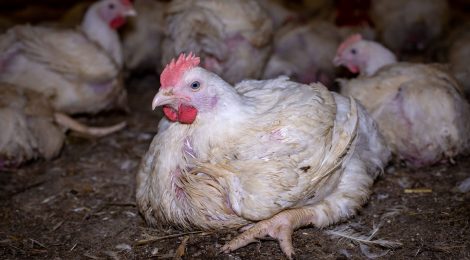
Chickens Allowed More Than Industry Standard of 1 Hour of Darkness Are Healthier
New research has confirmed what common sense has long held to be true: chickens allowed more than the industry standard of one hour of darkness a day are healthier.
Today, chickens raised for meat (called ‘broilers’) are typically allowed just one hour of darkness in a 24 hour period under the premise that the continued exposure to light will keep the birds eating and bring them to market weight faster.
However, new research by master’s student Tony Shynkaruk at the University of Saskatchewan shows that birds allowed more natural levels of darkness eat more frequently, have less risk of developing glaucoma, better mobility, reduced risk of mortality, and contrary to industry assumption, are actually heavier.
Dr. Karen Schwean-Lardner presented the work last month at the Animal Nutrition Conference of Canada.
The research exposed groups of chickens to one, four, 7 or 10 hours of darkness to determine which was best for bird health.
Earlier work by Dr. Schwean-Lardner showed that four hours of consecutive darkness resulted in heavier birds and that the heaviest weights at 49 days of age were at seven hours of darkness.
Dr. Schwean-Lardner’s earlier research found that birds allowed a more natural light/dark cycle initially grow at a slower rate. This allows the birds to develop stronger skeletal and metabolic systems before putting on weight, which results in the birds being less at risk of developing painful and crippling leg disorders, which are common in today’s broiler chickens. The research found that birds with the poorest mobility were those with just one hour of darkness while those with the best mobility were allowed 10 hours of darkness.
The research found that another benefit of a more natural light cycle is better ocular health. Today’s chickens frequently suffer from glaucoma from overexposure to bright light.
While research like this may seem unnecessary as it’s simply common sense that animals allowed a more natural light cycle will be healthier, it is a sad fact that studies like these are needed to confront industry’s continuance of cruel practices.


